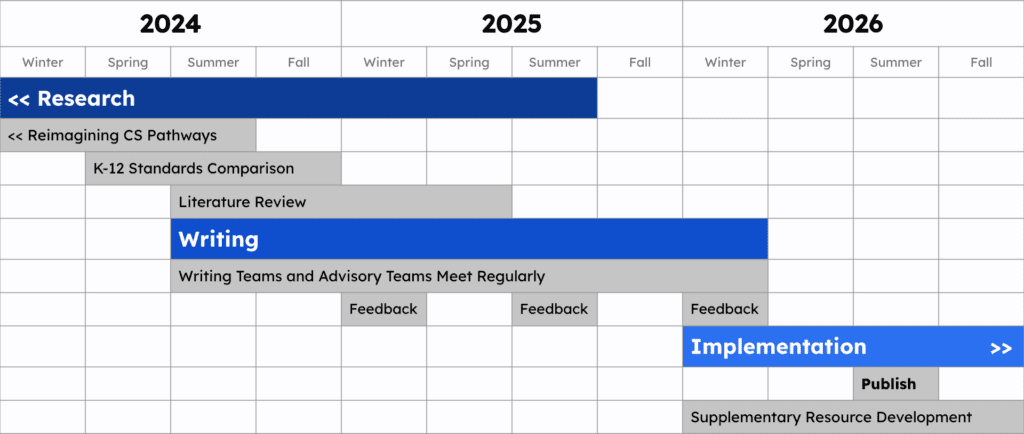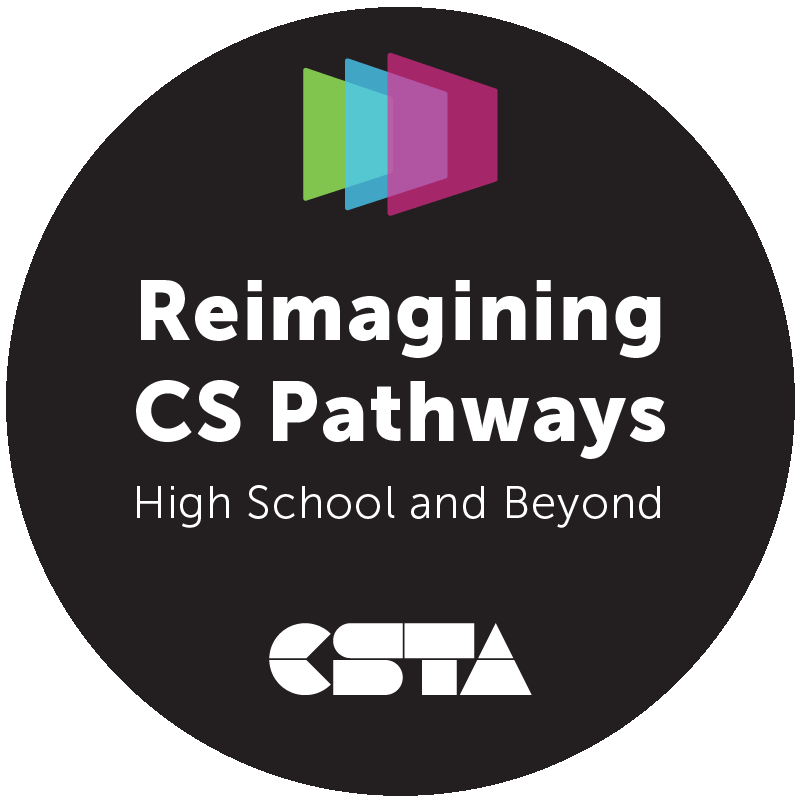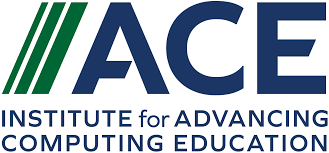K-12 Standards Revision
CSTA is conducting a comprehensive revision to its K-12 Standards with an anticipated release in summer 2026. A three-year process will result in a thoughtful, comprehensive, and evidence-based revision to these standards, taking place across three stages: (1) Research, (2) Writing, and (3) Implementation. Wide community participation will be necessary to ensure a high-quality output. Please help review and provide feedback on draft standards.
The CSTA K–12 Computer Science Standards delineate a core set of learning objectives designed to provide the foundation for a complete computer science curriculum and its implementation at the K–12 level. The Standards, last published in 2017, were designed by educators to be coherent and comprehensible to teachers, administrators, and policymakers. The Standards are a primary resource for state and local education agencies (SEAs and LEAs) when determining what K-12 students need to know and be able to do in computer science. The near universal adoption of these standards promotes coherence across the U.S., impacting millions of students through their impact on state policy, curriculum development, teacher certification, and teacher preparation and professional development.

Review Draft Standards
The standards writing team is thrilled to share Draft 2.0 of the revised CSTA K-12 Standards with CSTA members and the CS education community for feedback. Please submit your feedback via the form linked below by Friday, June 13.
It’s Time to Update!
It is important to revise the CSTA K-12 Standards for several reasons:
- It’s been a while: When we publish these proposed Standards in 2026, it will have been nearly 10 years since the last set, making it the longest gap between revisions.
- Research has evolved: There is now far more CS education research, and this enables us to examine the latest literature to develop evidence-driven Standards.
- Implementation has surged: Far more K-12 students are learning CS than ever before. We can learn from trends in implementation to identify strengths, gaps, and issues with the current Standards.
- Great advances in emerging fields: AI, cybersecurity, quantum computing, and data science have had tremendous advances in recent years, but these are mostly absent from current standards. There is a need for clarity on whether and how to incorporate these related disciplines in grades K-12.
- States have revised standards: As nations and states have adopted K-12 CS standards in recent years, many have made thoughtful revisions. We can learn from and incorporate some of this work.
In response to these shifts, CSTA is conducting a three-year CSTA K-12 Standards revision process. Research began in fall 2023, and writing kicked off in September 2024. An anticipated timeline for the revision process can be found below, with a target of summer 2026 for publishing the updated Standards.

We Need Your Input
CSTA seeks qualified individuals to serve as reviewers during the CSTA K-12 Standards Revision process. The writing phase began in September 2024, with an anticipated launch of update standards in summer 2026. Responsibilities for reviewers include: (1) reading drafts of revised standards at key intervals and (2) providing detailed feedback to help improve quality. The commitment is expected to be approximately 2-3 hours of asynchronous work during each of three review periods: January 2025, May/June 2025, and January 2026.
Please indicate your interest in serving as a standards reviewer by completing and submitting this form. Applicants will be notified of selection status on a rolling basis. Reviewers that actively and fully participate in the review process will be acknowledged in final products.
Thank you for your interest in this important work. Please contact jacob.koressel@csteachers.org with any questions.
Standards Writers
The writing team will propose the overall structure of the revised standards, as well as specific content of standards within each grade or grade band. Writers meet regularly to collaboratively develop content and incorporate ideas from community feedback.
The writing team consists of 24 individuals and includes representation from the following roles: K-12 educators, K-12 administrators, state departments of education, CS education-focused organizations, higher education faculty, researchers, and curriculum experts. Writers were selected through a competitive application process and are listed below.
Advisors
Advisory Board members provide insight and expertise to inform the overall standards revision process and direction. They review work products at regular intervals to validate and provide feedback. Advisors also consult with writing teams to provide their specific expertise and help resolve outstanding questions.
The selected advisors have strong connections to the CS education community, a demonstrated track record of thought leadership, and/or specific areas of expertise that are needed to inform the process at a high level. A full list of standards advisors can be found below.
State CS Supervisors
- Alabama: Amanda Dykes
- Arkansas: Adam Musto
- Arizona: Alecia Henderson
- California: Katherine Goyette
- Hawaii: Brett Tanaka
- Idaho: Katie Bosch-Wilson
- Illinois: Neha Thakkar
- Iowa: Michelle Meier
- Kansas: Stephen King
- Kentucky: Dr. Sean Jackson
- Massachusetts: Paula Moore
- Maryland: Elissa Hozore
- Maine: Allison Braley
- Minnesota: Sarah Carter
- Missouri: Michael Corcoran
- North Carolina: Eli Hamrick
- Nebraska: Shaun Young
- New Mexico: Dr. Melissa DeLaurentis
- Ohio: John Wiseman
- Oklahoma: Jeremy Maker
- Pennsylvania: Sara Frey
- South Carolina: Sherri Smith
- Utah: Kristina Yamada
- Washington: Terron Ishihara
- Wisconsin: Amy Bires
Corporate Partners
- Josh Caldwell, Google
Curriculum / PD Providers
- Dr. Jamila Cocchiola, Code.org
- Rebecca Dovi, BootUp Professional Development
- Bill Marsland, Code Ninjas
- Dr. Cynthia Mitchell, College Board
- Dr. Brandon Nicholson, Hidden Genius Project
- Katie O’Shea, CodeHS
- Andrea Wilson Vazquez, Raspberry Pi Foundation
- Ashley Woodard, Girls Who Code
District Leads
- Jared Amalong, Sacramento County Office of Education
- Christy Crawford, New York City Dept. of Education
- Laura Gray, Gwinnett County Public Schools
- Elizabeth Shaw, Santa Cruz County Office of Education
International Partners
- Australia: Bruce Fuda, Grok Academy
- India: Spruha Satavlekar, Indian Institute of Technology Bombay
- Korea: Wonjin Yu, Purdue University
- Turkiye: Dr. Yasemin Gulbahar, Columbia Teachers College
- United Arab Emirates: Tai Paschall, Bloom Charter School
- United Kingdom: Dr. Jane Waite, Raspberry Pi Foundation
Nonprofits
- Dr. Alexis Cobo, CSforALL
- Dr. Christina Gardner-McCune, AI4K12
- Dr. Jaci McCune, ECEP Alliance
- Dr. Laurie Salvail, CYBER.ORG
- Shana V. White, Kapor Foundation
Researchers
- Dr. Diana Franklin, University of Chicago
- Dr. Mark Guzdial, University of Michigan
- Irene Lee, Massachusetts Institute of Technology
- Dr. Tia Madkins, University of Texas at Austin
- Dr. Ryan Torbey, University of Texas at Austin
School of Ed Faculty
- Dr. Michelle Friend, University of Nebraska Omaha
- Dr. Todd Lash, University of Illinois
- Dr. Christine Liebe, Colorado School of Mines
- Jen Rosato, University of Minnesota
Acknowledgements
OUR CATALYST PARTNERS




ADDITIONAL PARTNERS
Thank you to the following partners for supporting this CSTA K-12 Standards revision project:
- Association for Computing Machinery (ACM)
- Kapor Foundation
- Microsoft
- WestEd
REIMAGINING CS PATHWAYS
The Reimagining CS Pathways: High School and Beyond project convened representatives from K-12 ed, higher ed, and industry in the U.S. to develop community definitions of (1) what CS content is essential for all high school graduates and (2) pathways for continued CS learning. This project was co-led by the Institute for Advancing Computing Education (IACE), and organized collaboratively with the following partners:
- Association for Computing Machinery (ACM)
- Code.org
- College Board
- CSforAll
- Expanding Computing Education Pathways (ECEP) Alliance.
This project and resultant material is supported by the National Science Foundation (NSF) under Grants No. 2311746 and 2444214. Any opinions, findings, and conclusions or recommendations expressed in this material are those of the author(s) and do not necessarily reflect the views of the NSF.


